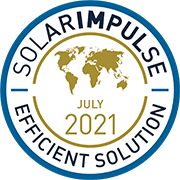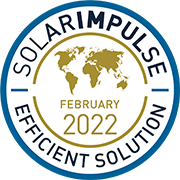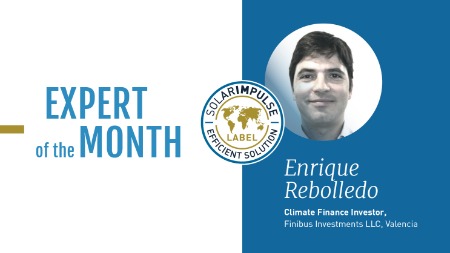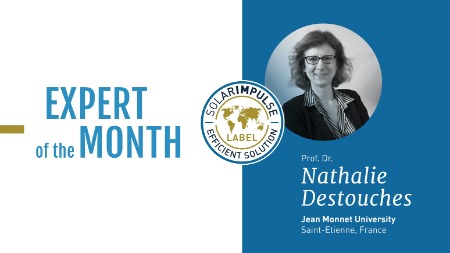Interviews - March 1, 2023
March's Expert of the Month: Olivier Marie!


Written by Olivia Mahaux 4 min read
The Expert Community of the Solar Impulse Foundation is a vital network of professionals who assess and promote clean and profitable technologies worldwide through the Efficient Solution Label. Comprising Experts from diverse fields, including research, engineering, and consulting, the Solar Impulse Foundation recognizes the outstanding contributions of one of its Experts each month. We are proud to honor Olivier Marie as our Expert of the Month for March.
March's Expert of the Month: Olivier Marie!
Olivier joined the Expert Community in 2020 and completed 18 assessments. His exceptional performance led to him being recognized as one of the top 20 best-performing Experts for the 2022 Awards, highlighting his commitment to the Solar Impulse Foundation's mission.
In this article, we delve into Olivier's professional background and expertise.
Can you start by telling us about your area of expertise and profession?
I’m a chemical engineer by training. When I started my career in the 80’s as a technologist with Exxon Chemical, plastics were considered innovative to a whole range of industrial products. I went to business school, joined a global management consulting company, and spent the next two decades focused on the energy sector, working with big oil and gas, chemical companies and utilities. I started my own consulting practice in 2005 to work exclusively on generating sustainable, cleantech solutions.
Can you share a success story or case study from your experience working with a Cleantech company, and what were the key factors that contributed to this success?
Biotech holds immense promise but needs long runways to scale and commercialize solutions. One of the biotech start-ups I’ve been mentoring for many years is developing a technology to help move the chemical industry from using fossil carbon to using atmospheric and waste carbon as feedstock, in effect helping the industry transition to a net positive circular economy. Today we have multiple joint development agreements in place with major chemical companies and we are close to launching industry-scale demo projects.
One of the keys to our success so far is that we learned an important lesson years ago, the hard way I might add, namely that you have to prioritize areas where the technology has a deep cost and carbon footprint advantage versus target petrochemicals. Another critically important factor is the quality of the team leading the company. The 3 co-founders share a common vision. They have complementary and critical skillsets. They nurture young talent and celebrate creative thinking which has led to 30 patents and counting.
How do you help Cleantech companies manage risk in a rapidly changing and unpredictable market?
I help them focus on understanding the short, medium and longer term business potential of their technology and then articulate their value proposition to customers and investors.
From your experience, how important are partnerships and collaborations in the success of Cleantech companies?
Absolutely essential. Partnerships and collaborations provide opportunities to scale, gain market access, and develop longer term sources of financing.
What advice would you give to individuals and organizations looking to make a positive impact on sustainability?
Don’t be afraid to look at the big questions and go for big impact. Don’t be content with deploying existing technologies with marginal impact.
What motivated you to become an Expert in the Solar Impulse Foundation's Expert Community in 2020? Among the Solutions you assessed, which ones stood out to you the most, and for what reasons?
Earlier in my career, I was helping companies optimize processes and business plans that contributed to the climate problems we are now trying so hard to solve. My whole motivation in setting up my own practice was to focus exclusively on transitioning to a cleaner world. I thought the Solar Impulse Foundation had a creative approach to this through Labeled Solutions and I wanted to learn from it and support it.
Among the Solutions I assessed, I can think of three that stood out: Red Hill Scientific (a clean plasma-based technology to produce nitrate fertilizers), Cheerio (fungi-based chitosan production technology) and E Warn Grain (Early warning technology for detecting hidden & visible infestation in grain (cereals/pulses) stored in bulk). Each of them is creative from a technology approach, solves serious environmental problems economically and has promising growth perspectives. Somehow, they embody a “back to the drawing board” approach rather than making marginal improvements to existing supply chains and technologies.
What are your expectations for the future of Labeled Solutions, as well as the Solar Impulse Foundation as a whole?
There is so much confusion facing consumers today. What’s truly helpful? What isn’t? Labeled Solutions can help build that bridge to a sustainable, circular economy because it comes from an authoritative body with one goal, that of quickly identifying the solutions that can save our environment.
As for the Foundation, I’d like to see them grow regional and national buy-in to their approach and get mandates or preferences in place, for instance, starting with government agencies, requiring them to only purchase Labeled Solutions.
Anything else you would like to add or share?
I am truly honored to be part of the Solar Impulse Foundation’s Expert Community. It’s inspiring to take part in the innovative thinking that we are doing together.

Written by Olivia Mahaux on March 1, 2023








